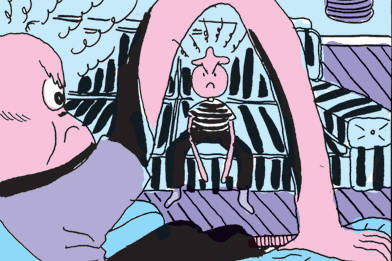When Jake Davis, Ryan Ackroyd, Mustafa Al-Bassam, and Darren Martyn came together onstage for an after-show talk at the London premiere of Teh Internet Is Serious Business, it was the first time they had all been in the same physical space. “Even though they had spent more time together than some families, online taking down global institutions, they’d never looked each other in the eye,” Welsh playwright Tim Price, the man behind the play, tells me. Before this moment, their relationship had existed solely in clandestine chat rooms, their identities attached to very different names: Topiary, Kayla, Tflow, and Pwnsauce. Under these screen names, along with co-conspirators Sabu and AVunit, the group came to be known in 2011 as LulzSec, and together they infiltrated, hacked, or leaked information from Fox, Sony Pictures, PBS, Westboro Baptist Church, the U.S. Senate, the FBI, the CIA, and many others. They did all this in a mere 50 days—the “50 Days of Lulz”—before officially calling it a day for the project. That is, until they picked it back up for a moment to hack the Tunisian government, law-enforcement agencies in Arizona and the UK, and British tabloid The Sun, all before the FBI managed to infiltrate the group, leading to most of their arrests.
An outgrowth of Anonymous’ infamous 2008 attack on the Church of Scientology (Project Chanology), LulzSec went from prankish trolling to media sensations that terrified, and thoroughly embarrassed, world governments with whiplash speed, even though it was all done “for the lulz.” Washington Ensemble Theatre’s production of Teh Internet is Serious Business, Price’s anarchic recounting of the group’s rise and fall, marks the play’s stateside debut. It’s also quite possibly the first time Internet memes will appear as characters on an American stage, with speaking roles for 4chan meme classics like Pedobear, Grumpy Cat, and Advice Dog.
“I’d never seen a play before that captured, for me, what the Internet felt like—the fluidity, the collisions of popular and niche cultures, the color, vibrancy, and frontier spirit,” Price says. “Plays about the Internet always had someone sat at a screen, and designers always had scrolling screens of HTML, and people shouting ‘I’m in!’ ” Price made a rule for himself when writing the script—no screens allowed—so he took an unusual structural route. True to the source, and with lots of input from LulzSec members themselves, almost the entirety of the play takes place within LulzSec and Anonymous chatrooms. As the group plots and reacts to their various hacking conquests, the characters’ spoken lines butt into and run over each other, simulating the chaotic energy of a group IM conversation. The result is a frantic, frequently disorienting script, only briefly zooming out from cyberspace to show bits and pieces of the hackers’ IRL contexts or reactions from their victims.
Teh Internet is only the latest in a slew of plays Price has written with contemporary political angles. He was inspired to write about Anonymous after his 2012 script The Radicalisation of Bradley Manning. Price became obsessed with the story of the U.S. soldier, championed as a hero by Anonymous after being jailed, who sent secret government cables about the Iraq and Afghan wars to Wikileaks—doubly so after Price learned Manning went to secondary school in his native Wales.
While LulzSec’s story may have been an interesting footnote to most folks in 2011, today in 2017, the activities of shadowy, anonymous cybergroups has leaked into the mainstream, whether with the alt-right’s meme wars or the alleged Russian hacking scandal. “The state-sponsored hacking ‘scandal’ is laughable because the majority of hacking that goes on is state-sponsored,” Price says of the alleged tampering with the election. “We know this from the LulzSec story.” Indeed, Teh Internet follows LulzSec through its FBI infiltration, when hacker Sabu was secretly apprehended, turned into a mole on a plea deal, and later asked by the FBI to hack the Brazilian government. (Sabu, aka Hector Monsegur, now works for Seattle-based cybersecurity firm Rhino Security Labs.) In a more recent example, a 2017 Wikileaks cable showed that the NSA had been stockpiling security vulnerabilities for common consumer devices like iPhones and voice-controlled televisions.
“I would suggest the people who are really keeping us safe right now are the 15-year-old freelance hackers sitting in their bedrooms doing the bounty-hunts, finding the vulnerabilities, and, unlike NSA, reporting them to the companies and giving them a chance to close, repair, and keep our information safe,” Price says. LulzSec’s adventures weren’t all nefarious; when they found vulnerabilities in the English National Health Service’s system, they simply sent a friendly e-mail alerting them. “We mean you no harm and only want to help you fix your tech issues,” they wrote.
Far ahead of the game, LulzSec realized the power that organized, anonymous people on the Internet could wield over the offline world. “Rather than learning from them, the establishment continued to ignore the power of online cultures, resulting in 2017 where we have a celebrated Internet troll in the White House,” Price says. “A guy who the CIA has to turn briefing documents into pictures for because ‘The President learns visually.’ In 2011 LulzSec took down the CIA’s website, and said ‘Ignore us at your peril.’ The CIA refused, and now it’s having to turn intelligence into memes so the President can understand it.” But perhaps by turning memes into theater, IRL audiences can begin to understand the breadth of their own powers. Just make sure to watch out for the FBI. ksears@seattleweekly.com
Teh Internet Is Serious Business, Washington Ensemble Theatre, 1620 12th Ave., washingtonensemble.org. $15–$25. All ages. Fri., Sept. 15–Mon., Oct. 2.








